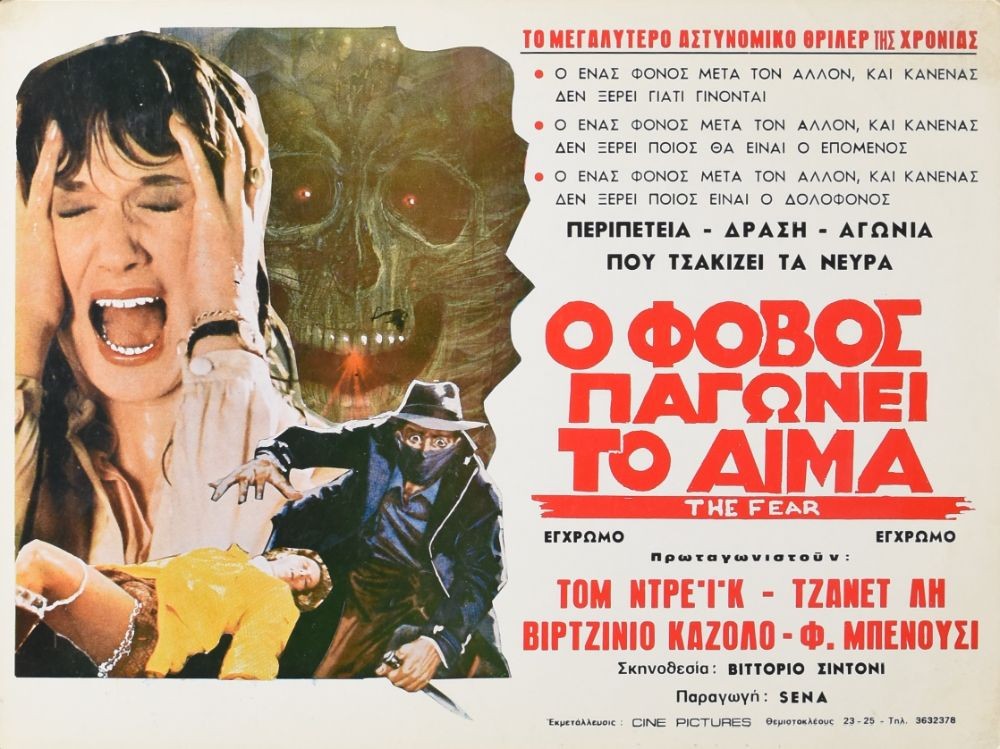Failing to hear an approaching train, an old, deaf railroad crossing guard is killed whilst unenthusiastically swinging a pickaxe towards some stones (props for the shots which frame both him and the approaching train by the way, the ballsiness of which make up for the credits sequence containing the drabbest cinematography of all time). Initially thought of as a tragic accident, when it emerges that the guard had amassed a small (this being the operative word) fortune by playing stocks, and when his adopted son Janot quickly dies in another apparent accident, it seems that his heirs are engaged in a deadly battle to secure his inheritance. Will Inspector Greville, a horrendously-toupéed Inspector sent from the Big City to investigate, be able to prevent more the killer taking more scalps? Or, will the hair-raising slaughter wig him out? There'll be hell toupée if he doesn't succeed! Etc, etc.
I've actually already, in those opening two paragraphs, addressed the bulk of the viewing notes I took - this is an enjoyable yet extremely disposable film. The French setting is delightfully quaint, and the cinematography, while rough and ready, can't really go far wrong given the beautiful countryside setting (an Italian setting in reality, apparently). Even the shabby interiors have a kind of charm, and do add verisimilitude - rural French villages wouldn't have been home to many slick, spick and span apartments. There is one terrific example of such a location; the residence of the local playboy who owns the discotheque (and whose idea of décor is horrendous stripy wallpaper and some nudie magazine cut outs stuck on a mirror).
The plot is reasonably tight, albeit the lack of a clearly-defined lead character does hurt it somewhat - we're presented with a load of people who occasionally act in a suspicious manner before being summarily dispatched in reasonably inventive ways (and one non-death fight scene is particularly inventive, as it involves a man being somehow savagely beaten with a towel). No-one is presented as being conclusively innocent, so we're limited to being curious observers rather than having any real investment in the fates of the characters.
The end revelations do make sense, just about, although there are too many collaborators for the explanation to be in any way believable. One of the characters' real identity, especially, is very much out of left-field, and while they don't necessarily do anything which definitively makes no sense, some of the things they've said over the course of the film do sail quite close to the wind (specifically, expressing doubts regarding the seeming resolution of the case needlessly invites further scrutiny). But, then again, it could be argued that it's what the character might be expected to say in the circumstances, had they not been knee-deep in deceit.
There's not a whole else to say about the film, really - I watched eight years after my first viewing in order to write this review, and my main memories of it were a) that it contained a ginger character (surely either Ernesto Colli or Bruno Corazzari [the former, as it turns out]) and b) there are train tracks. When the memory of this second viewing fades, I may also remember some truly fascinating dancing from the disco scene, a lot of incidental 'characters' staring curiously down the camera lens, and the one way in which it may have had a huge influence on American slasher films: having a forty year old (OK, a balding 28 year old who looks forty) playing a teenager. So, while it won't be troubling anyone's rankings of top tier gialli, it's fun, disposable fluff, which achieves more on a clearly limited budget than many other films manage with far more resources.

 RSS Feed
RSS Feed
